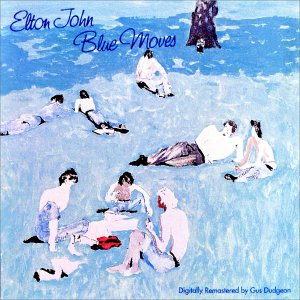
"Blue Moves" (1976) Was One Of The Moodiest Albums Of Elton John's Career, And Something Entirely Removed From "Goodbye Yellow Brick Road" (The Only Other Double Album He Ever Issued)
When being interviewed in 1991, Elton John remarked that he had not released a good album ever since 1976’s “Blue Moves”. He also termed it an album where he did absolutely what he wanted to do. He went to say that he wasn’t really thinking about pleasing anybody but himself, to come up with a record that he would like to listen afterwards. That might go some way into explaining why the double album yielded virtually no hit singles (“Sorry Seems To Be The Hardest Word” was the lone exception, peaking at #6) and why it would take time for “Blue Moves” to grew into stature until it became one of his most respected works among critics and fans alike.
Certainly, if we were to compare “Blue Moves” with the only other double album Elton issued in his career (1973’s “Goodbye Yellow Brick Road”) the difference is entirely apparent. “Goodbye Yellow Brick Road” was an album for everybody, or (rather) an album where Elton performed in ways everybody was sure to appreciate. It was to become his most representative work to the public at large, and a true embodiment of every facet that defined his classic years. It was pop music at his best, and the way in which he approached issues like mortality and transience (“Funeral For A Friend/Love Lies Bleeding”, “Candle In The Wind”…) did attenuate the gravity at play. If anything, the music was so full of life that he could sing about just anything (“Social Disease”) and get away with it. A truly negative connotation could only surface if you looked for it, and if you looked for it in an extensive way at that.
On the contrary, “Blue Moves” was an album in which you could read negativity at every turn. Because it was an album where Elton clearly spoke to himself. There are fewer examples of John’s music sounding this introspective. And when it did, Elton was singing about a character (“Captain Fantastic & The Brown Dirt Cowboy”). Here, you listen to him in the most direct and unstripped setting. No wonder “Goodbye Yellow Brick Road” was critically acclaimed from the beginning, and “Blue Moves” could only be appreciated in retrospective. Continue reading

